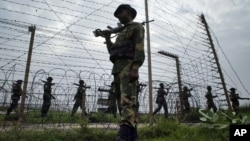ISLAMABAD —
Pakistan is accusing India of a cross-border raid in the disputed Kashmir territory, killing at least one Pakistani soldier and critically wounding another. But Indian officials say their troops fired across the border after being attacked from Pakistan. The incident is unlikely to seriously affect the peace process that has dramatically improved diplomatic ties.
Army officials in Pakistan say Indian troops crossed the disputed Kashmir border known as the "Line of Control" early Sunday and "physically raided" a Pakistani military outpost in the Bagh region. They say Indian troops withdrew after an exchange of gunfire.
Indian military officials dismissed the Pakistani claims as "baseless," saying their troops only returned fire from across the border.
India and Pakistan have accused each other of several violations of a cease-fire in Kashmir announced in 2003.
But the two nuclear-armed neighbors have taken significant steps in recent months toward normalizing trade, cultural, sports and political ties. Last month, India and Pakistan signed a landmark deal to relax some visa restrictions to facilitate cross-border travel.
Pakistan and India have fought three wars and the Pakistani military has trained and equipped itself to be ready for another conflict.
But the military is reported to have redefined that doctrine recently because it has been engaged in fighting domestic and foreign terrorist networks like al-Qaida and the Pakistani Taliban, which are entrenched in the northwestern tribal region bordering Afghanistan.
Speaking to VOA, Pakistani Information Minister Qamar Zaman Kaira says improved ties with India have reduced the external threat to his country.
"Yes, we had a very difficult time with India. We have [fought] three wars," he said. "Our forces were determined and they were cautious of the Indian threat. That threat is not over. Of course still it is there. But now the internal threat has taken over. It is a greater threat of course now. Pakistan is the biggest victim of this terrorism or extremism."
Pakistan is an ally of the United States in its war on terrorism and Pakistani officials say their country has suffered unprecedented losses during the past decade in that fight.
But allegations the Pakistani military harbors extremist groups who attack government and coalition forces in Afghanistan remain a major source of diplomatic tensions between Islamabad and Washington.
Speaking to reporters Saturday, U.S. Embassy deputy chief Richard Hoagland said the United States appreciates Pakistan's stepped up anti-terror efforts
"Any way that Pakistan and the United States can recognize together the dangers of terrorism and extremism, can find productive and appropriate ways to work together, that is for everyone’s benefit and we appreciate that," he said.
Pakistan’s reluctance to uproot alleged bases of Afghan insurgents has prompted the United States to attack suspected militant targets using unmanned aircraft or drones.
The latest suspected U.S. drone attack took place on Sunday in the South Waziristan tribal district, killing more than a dozen alleged militants. Wednesday, top Pakistani militant leader Mullah Nazir was killed by a drone attack on his hideout in the same region.
The anti-U.S. warlord’s fighters were allegedly involved in fueling the Taliban insurgency across the border in Afghanistan.
Army officials in Pakistan say Indian troops crossed the disputed Kashmir border known as the "Line of Control" early Sunday and "physically raided" a Pakistani military outpost in the Bagh region. They say Indian troops withdrew after an exchange of gunfire.
Indian military officials dismissed the Pakistani claims as "baseless," saying their troops only returned fire from across the border.
India and Pakistan have accused each other of several violations of a cease-fire in Kashmir announced in 2003.
But the two nuclear-armed neighbors have taken significant steps in recent months toward normalizing trade, cultural, sports and political ties. Last month, India and Pakistan signed a landmark deal to relax some visa restrictions to facilitate cross-border travel.
Pakistan and India have fought three wars and the Pakistani military has trained and equipped itself to be ready for another conflict.
But the military is reported to have redefined that doctrine recently because it has been engaged in fighting domestic and foreign terrorist networks like al-Qaida and the Pakistani Taliban, which are entrenched in the northwestern tribal region bordering Afghanistan.
Speaking to VOA, Pakistani Information Minister Qamar Zaman Kaira says improved ties with India have reduced the external threat to his country.
"Yes, we had a very difficult time with India. We have [fought] three wars," he said. "Our forces were determined and they were cautious of the Indian threat. That threat is not over. Of course still it is there. But now the internal threat has taken over. It is a greater threat of course now. Pakistan is the biggest victim of this terrorism or extremism."
Pakistan is an ally of the United States in its war on terrorism and Pakistani officials say their country has suffered unprecedented losses during the past decade in that fight.
But allegations the Pakistani military harbors extremist groups who attack government and coalition forces in Afghanistan remain a major source of diplomatic tensions between Islamabad and Washington.
Speaking to reporters Saturday, U.S. Embassy deputy chief Richard Hoagland said the United States appreciates Pakistan's stepped up anti-terror efforts
"Any way that Pakistan and the United States can recognize together the dangers of terrorism and extremism, can find productive and appropriate ways to work together, that is for everyone’s benefit and we appreciate that," he said.
Pakistan’s reluctance to uproot alleged bases of Afghan insurgents has prompted the United States to attack suspected militant targets using unmanned aircraft or drones.
The latest suspected U.S. drone attack took place on Sunday in the South Waziristan tribal district, killing more than a dozen alleged militants. Wednesday, top Pakistani militant leader Mullah Nazir was killed by a drone attack on his hideout in the same region.
The anti-U.S. warlord’s fighters were allegedly involved in fueling the Taliban insurgency across the border in Afghanistan.




